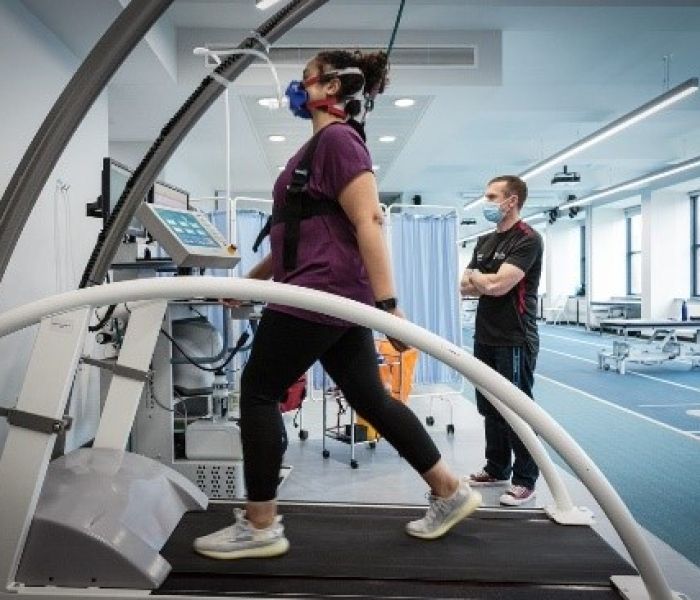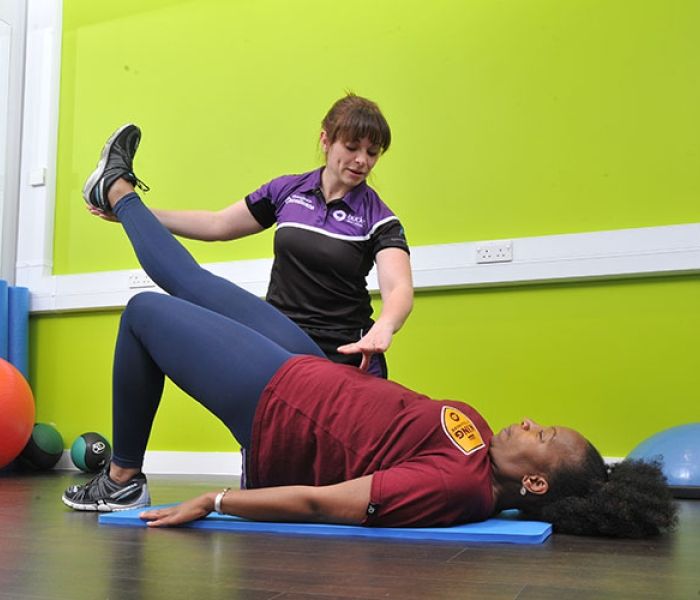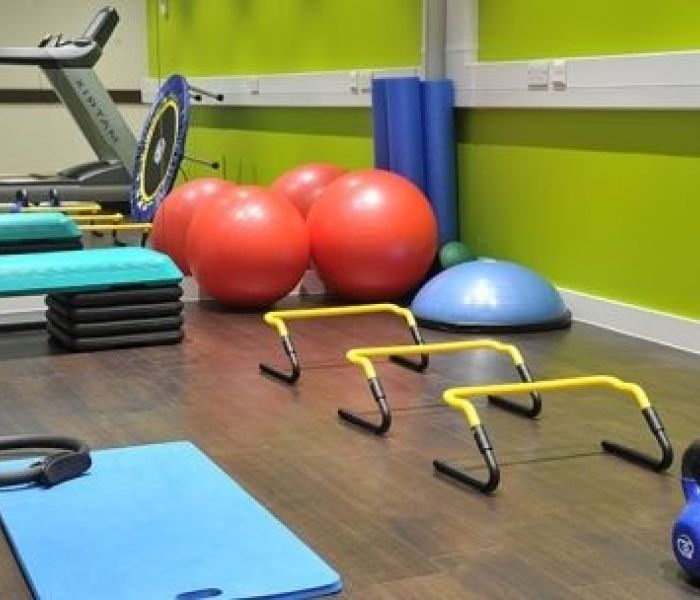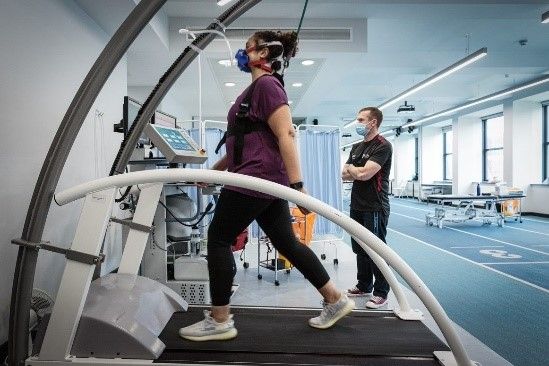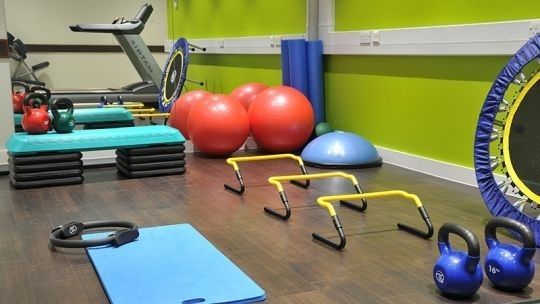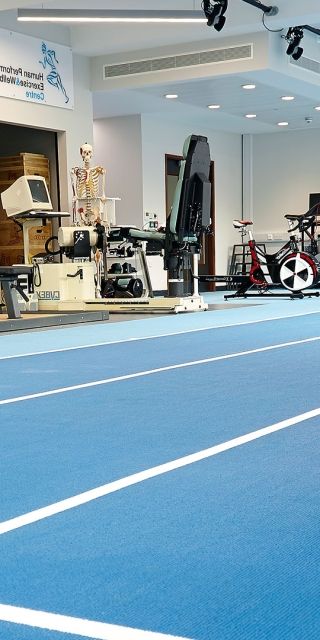
Book a session
Book a session
We offer a range of testing packages, depending on your needs. Whether you want a detailed health check, a fitness test, or a musculoskeletal assessment – we can help you.
To book any of the below packages/individual tests or for further information please call 01494 603 090 or email philip.woodbridge@bnu.ac.uk.
You can find us at the High Wycombe Campus, Queen Alexandra Road, High Wycombe, Buckinghamshire, HP11 2JZ.
Physiology Assessment Test Package (£200, approximately 1.5 hours)
Test key markers of endurance fitness and provide accurate training zone guidance to improve training structure and delivery. Tests can also be booked individually.
- Approximate duration: 45 minutes
- Individual cost: £75
- Measures: Maximal oxygen consumption
- Suitable for: Anyone interested in their cardiorespiratory fitness in comparison to normal or athletic populations
Maximal oxygen consumption (V̇O2max) provides a measure of an individual’s cardiorespiratory (or endurance) fitness. It reflects the ability to take in, transport, and use oxygen in the active muscle.
Typically, the higher an individual’s oxygen consumption, the greater their endurance ability. Maximal oxygen consumption is influenced by a range of factors including exercise type, age, sex and training status.
This is a maximal effort test and requires participants to exercise (run/cycle/row) to exhaustion during an incremental test that typically lasts 8-10 minutes. The test results will be compared to the population of interest and feedback will be given on endurance fitness classification.
- Approximate duration: 1hr
- Individual cost: £100
- Measures: Lactate threshold, Lactate turnpoint, heart rate training zones
- Suitable for: Any athlete wishing to adopt a scientific approach to their training and understand their individualised training zones
Lactate threshold is the intensity (speed/power) at which blood lactate accumulates in the blood at a faster rate than it can be removed, leading to an increased rate of fatigue. Calculating the lactate threshold allows for the prescription of training zones that can be used to design a suitable programme to improve cardiorespiratory fitness and endurance performance.
This is a sub-maximal step-test, which will require you to exercise in 3-4-minute stages at progressive speeds/power outputs. During this test your heart rate and blood lactate (via a capillary blood sample) are recorded to create a profile, and heart rate zones suggested to guide your training and monitor progress.
- Approximate duration: 10 minutes
- Individual cost: £40
- Measures: Fat mass-fat-free mass, body water, skeletal muscle mass, body compartment breakdown
- Suitable for: Anybody
Our analyser uses bioelectrical impedance to provide an accurate and reliable breakdown of the composition of individual arms, legs, and torso in one quick, easy, and non-invasive measurement.
You will receive a report that breaks down your fat mass, muscle mass and water content. This analyser is validated against the gold standard recognised by medical science.
Health Assessment Package (£80, approximately 40 minutes)
This package is designed to give you an individualised summary of industry standard health & wellbeing markers that can be used as a baseline to assess the results of lifestyle changes. Tests can also be booked individually.
- Approximate duration: 10 minutes
- Individual cost: £40
- Measures: Fat mass-fat-free mass, body water, skeletal muscle mass, body compartment breakdown
- Suitable for: Anybody
Our analyser uses bioelectrical impedance to provide an accurate and reliable breakdown of the composition of individual arms, legs, and torso in one quick, easy, and non-invasive measurement.
You will receive a report that breaks down your fat mass, muscle mass and water content. This analyser is validated against the gold standard recognised by medical science.
- Approximate duration: 30 minutes
- Individual Cost: £50
Basal metabolic rate (BMR) is the amount of energy required to maintain the body’s normal metabolic activity, such as respiration, maintenance of body temperature (thermogenesis), and digestion. Specifically, it is the amount of energy required at rest with no additional activity. The energy consumed is sufficient only for the functioning of the vital organs such as the heart, lungs, nervous system, kidneys, liver, intestine, sex organs, muscles, and skin. We can use the measurement of BMR to work out your estimated total daily energy requirements (TEE).
Muscle Testing and Movement Analysis
Contact us at philip.woodbridge@bnu.ac.uk to book each of these bespoke services.
- Approximate duration: 45 minutes
- Individual Cost: £100
Isokinetic Dynamometer testing is used to assess strength in two opposing muscle groups, such as the quadriceps and hamstrings. They resist applied forces and are controlled at a predetermined rate. Muscle balance is essential for improved performance and injury prevention. The test involves using the Cybex Humac Dynamometer machine to measure several muscle contractions and a report will be produced comparing sides (left and right) and opposing muscles (agonists and antagonists).
- Approximate duration: 20 minutes
- Individual cost: £30
Counter movement jump (CMJ) is used to assess lower body explosive power. The test involves standing on a jump mat and performing three single leg jumps on each leg and then comparing the jump height.
- Approximate duration: 20 minutes
- Individual Cost: £30
The Y-balance test assesses your ability to balance on one leg whilst reaching with the other leg. The test requires standing on a plastic beam and then reaching as far as possible with the other foot in three different directions. The results are then collated and left versus right legs are compared.
- Approximate duration: 25 minutes
- Individual Cost £30
The functional movement screen (FMS) is used to assess various functional movements to detect possible asymmetries and deficiencies in muscle length, strength and control. The test involves performing seven different functional movements; Deep Squat, Hurdle Step, In-line Lunge, Active Straight-leg Raise, Trunk Stability Push-up, Rotary Stability, Shoulder Mobility.
- Approximate duration: 30 - 45 minutes
- Individual Cost: £75 (NordBord) and £100 (ForceFrame)
VALD Performance testing is used to assess and train strength. We offer two different tests, ForceFrame or NordBord. The ForceFrame is a versatile device used to isometrically test all major joints of the body. Isometric strength is a force produced by a voluntary muscle contraction against a fixed resistance. The NordBord specifically assesses isometric and eccentric hamstring strength. Both devices test for muscle balance which is essential for improved performance and injury prevention.
Bespoke services
Corporate team building: Tips from the Olympics
The Sports Science Team at Buckinghamshire New University have designed a fun and exciting day of professional development that will invite your team to think about their health and activity levels, based on our experience working in the Olympic games.
Olympians employ a selection of practices in all areas of their life to perform consistently and maximise their chances of success – all based around the key principles of training, recovery and nutrition.
The Olympian mindset can be applied to business and sport to improve quality of life for you and those around you.
By sharing lessons learnt from years of working with some of the world’s top athletes, the Sports Science & Therapy teams will give you some ideas on how to make marginal gains to your daily practice to improve health and productivity at home and work.
Over the course of a day you will have the chance to engage in a fun teambuilding session and learn the tips and tricks that help elite athletes perform day to day. You will learn about your own health and activity habits and identify some small ways in which you can improve.
Schools and colleges visits
We offer a range of school and college packages, including day visits and talks. We can also provide bespoke support for professional teams. Previous clients include England Handball, Wycombe Wanderers, Watford FC Academy, FAB Academy and Reading Ladies FC.
Sports team
In partnership with Wycombe Wanderers FC, we worked with the squad and fitness staff during pre-season testing, which involves both lab-based and ground-based testing. Goalkeepers in particular make use of our Neurotracker system to help train perceptual-cognitive ability.
In April 2015, We made a positive contribution to the England Touch Rugby Women’s 27 squad as they prepared for their World Cup campaign. This involved squad testing, training programmes, and informative lectures around topics such as recovery and supplementation for optimum performance.
Research and consultancy
We're also big on research, having worked with Wycombe General Hospital’s Type 1 Diabetes research team, led by Diabetes specialist Dr Ian Gallen. We helped examine novel ways to reduce hypoglycaemia in physically active Type 1 Diabetics, including the use of caffeine, insulin pump management, and different types of insulin.
We're always interested in taking on new research and consultancy projects in the Human Performance Laboratory, so please contact us to discuss any ideas.
Nutritional analysis
Using nutritional analysis software (Nutritics), we can analyse your nutritional intake and identify the amount of nutrients consumed in a typical three-day period. We can then advise you on whether the energy consumed in terms of calories is suitable for your gender, age and fitness requirements or sporting activities.
Our nutritional software can also help identify any nutritional deficiencies and provide recommendations on food groups to be consumed to address these deficiencies.
The HPL in action
In addition to working with Wycombe Wanderers, we work with a variety of external partners in Buckinghamshire and Berkshire such as Bisham Abbey.
